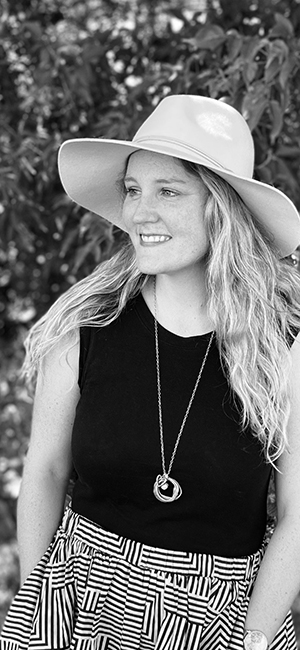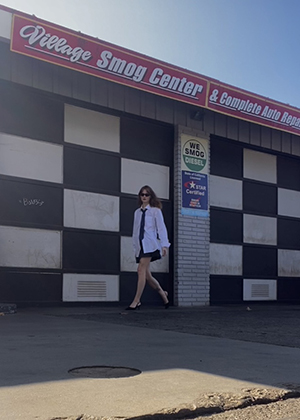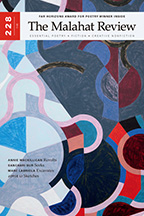On Being Twelve: JR Fellers interviews Colleen Sutton

Fiction Editorial Board intern JR Fellers talks with Colleen Sutton, whose creative nonfiction piece “East of LA” appears in our fall issue #228. They discuss the lustre of Cathy from East of Eden, the joy of reading “less classy” books, and the shift between what we actually find interesting, and what we think other people will find interesting about us.
Read an excerpt of “East of LA” here.
Colleen is a writer of creative nonfiction, short fiction, and poetry. Colleen’s short story, “Psych Ward” was published in The Grabbed Anthology: Poets and Writers on Sexual Assault, Empowerment and Healing. A diplomat for the Government of Canada currently stationed in Hong Kong, she speaks four languages fluently, with studies in another four. Colleen loves words, pronunciation, and studiously memorizing different verb tenses.
The character Cathy, from Steinbeck's East of Eden plays an important role in this essay. At times, she acts as an aspirational mirror to the young Colleen, who values Cathy's power, sensuality, and complication. By the end of summer, Cathy's lustre seems to have been lost. How has your perspective on this character evolved as you've grown older?
Maybe my father was right, and twelve is a bit too young to read East of Eden—so much went right over my head at that age. I know now that she’s meant to represent true evil and the devil, and although of course I caught portions of that, what I remember is being dazzled by her anyway. She’s this beautiful blonde bombshell, and she exerts so much control over those in her life. She also seemingly has control over her own life, and very few women that I’d read up until that point did. When I re-read it now, the symbolism hits me over the head and it’s hard to see Cathy as anything but sociopathic. But at the time, I only saw that Cathy was beautiful, desired, she leads her own life, defying her parents who seek to control her, forging her own path, creating a business for herself, leaving behind her loving but overbearing husband and the children she never wanted. I kind of glossed over the murder and underhandedness she displayed, and instead saw her as free and truly independent. Pre-pubescent kids can be remarkable at seeing what they want to see. But even as my perspective has changed over the intervening years, she’s still a heck of a more interesting character than Adam. I read a biography where Steinbeck referred to her as “my dear Cathy…” and I think she was his favourite too.
Twelveandahalf-year-old Colleen has already adopted the habits of an adult literary society—she understands the difference between the books one may be celebrated for reading, and the books one doesn't like to admit to having read. Do your reading habits still reflect any such division?
I think it’s hard to avoid the fear of judgment in our choices of entertainment. We know some books aren’t necessarily intellectually challenging or a “classic” and so we even have a term for it—our “guilty pleasure” or “trashy” reading or tv-watching. When I was younger, I would do my best to hide the covers of any less sophisticated material, even going so far as to try to make a book cover out of fabric to hide my reading. Now, I’ve become more confident in my choices and read a mix of fiction types, including genre fiction and literary fiction, and I’m not embarrassed by the less “classy reads.” But then—I periodically post book recommendations on my Instagram, and nearly all of them are of the more literary works I’m reading. So clearly there’s still a bit of that hesitation in me, which there shouldn’t be. There’s often nothing better than a good romance or a good mystery or crime thriller, and it gets people reading—romances are what kept me reading when I was younger. Everything has its place for each individual reader, and sometimes working through symbolism and dense text isn’t where you’re at that day—so pass me a good piece of trashy fun.
The appearance of Dan David adds tension and an element of danger to this essay. Upon learning of Dan David's double-identity and criminal proclivities, the family grapples to sort out fact from fiction in what they know of him. The danger Dan David presents is not the danger that we, as readers, expect of him. Were there any challenges you encountered while working through these multiple layers of perception and experience?
The story of our time with Dan David has lurked in the back of my brain for years, and we’ve referenced it as a family for a long time. “Hey remember when we found out about Dan David?” It’s such a surreal experience, that even telling people about it now, trying to explain how we spent time with someone wanted by the FBI, considered him a friend, seems absurd. But it wasn’t until I’d already written the story that I got more details from my parents, details I hadn’t been privy to when I was a child, details of his sexual preferences which were…disturbing. And I’m glad I didn’t know about those while writing, because it would have changed the story for me, altered my perception of him once again. My mother told me, years later, that when they realized Dan David had left that morning, the first thing they did was look for me, her first instinct being that he’d taken me with him. She had intuited, even if she couldn’t have consciously vocalized it, that he was a danger to us, and specifically to her daughter. So the reality of him was already coming through to us all, even if we wouldn’t know the full extent for several more months. But I still struggle with not knowing, and in writing this story, I wondered about the fairest way to depict him—yes, fair for the criminal—and so I stayed as fact-based as I could, with 30 years in between for memories to become jumbled and condensed. I don’t know him, not really, and I never did. He will likely always remain a mystery, and laying that fact bare on the page felt like the easiest and most honest way of working out the knot.
In your essay, the exploration of sexuality is deeply intertwined with identity formation. There is an innate toggle between your perception of self and of what it means to be perceived in this coming-of-age narrative. How did you achieve balance in capturing these nuances?
It’s funny, my family has travelled a lot, I’ve travelled a lot, but this specific trip, to California and Baja Mexico, has retained some of the strongest, most crisp memories for me. Probably because these were the first moments where my childhood self started to meld into my more adult self. My coming-of-age, as you put it. And coming of age has so much wound up in sexuality. Traditionally, you cannot be a woman, or a man, until you’ve hit puberty. And for me, based on my Harlequins and probably every movie I’d ever seen at that point, you couldn’t be a woman if you weren’t desired by a man. And I was testing it out—I was testing it with Dan David, I was testing it with boys in the supermarket, I was testing it all the time. What is it to be attractive? What makes other people attracted to me, and what does that say about me? Is it only looks, or can I reel them in with personality and intelligence and yes, knowledge of classic literature? In this story, I tried to capture that constant shift we all feel, between what we actually find interesting, and what we think other people will find interesting about us. That year, seemingly out of nowhere, it was like a light switched on in others, and I could see that men and boys looked at me. They were interested in me. I think of it now and it’s astounding, I was only twelve for goodness’s sake but it’s the truth, I detected the change around me. That shift, and my reaction to it—both inviting it and scared of it—is part of what I wanted to convey in the story.
How important is the influence of literature—like Steinbeck, or Harlequin Romance—on your understanding of sexuality and coming-of-age? Did any other works of literature guide you in addressing these themes in your writing?
I think we’re constantly influenced by what we read, what we watch, the stories we tell. At least I was. I’m not sure if Harlequins have modernized or if it’s just that the romance novels that I read now have stepped it up, but when I was young, Harlequins and other romances were rough. They were formulaic, of course, but the formula, when I consider it now, was disturbing. Young woman, usually between 20-25, meets older man, between 35-45, loses her virginity to him, makes him fall in love with her, marries him. She must need help with crucial parts of her life, he must be smarter and more decisive, but also closed-off, needing her in order to understand what love is. There was often rape in these stories (at least as we would consider it now, I have no idea what went on in the 80s-90s mindset of the writer), definitely sexual conquest and the needs of the man trumped the woman’s needs. But it’s not just Harlequins—most stories have elements of these, the female character is generally secondary to the male characters and if not, she’s dominated by the men in her life. Cathy isn’t, she controls her own narrative. She’s evil, sure, but she wrestles control of her own destiny. I’m sure mixing in trashy literature and classics influenced me both in terms of what is possible and what is expected of women. Some other coming of age classics and feminist works that I remember reading and loving, in no particular order, were Little Women, The Little Princess, Are You There God? It’s Me, Margaret, The Great Gatsby, Jacob Have I Loved, A Doll’s House, and many more. I’m sure all of these have come together in some form and influence my writing.
While this essay provides a retrospective lens on a pivotal summer in your young life, it is written in the present tense. Can you speak to how this choice impacted the writing? Were you able to connect more intimately with your younger self?
The first paragraph of this story came to me fully formed, and the voice was my voice—I feel her, hear her, know her—but it’s still a voice from nearly three decades ago. Some of those memories are so crisp—I remember clearly using my brother’s back as a writing table, I remember meeting Dan David while laying by the pool, but I remember it only from my twelve-year-old self, if that makes sense. So there was no other way for me to tell the story, than from her perspective. It did make for some tougher moments while drafting—I wanted to jump ahead, to lend my adult perspective to what she was experiencing, and had to hold that in check. I also had to watch my language and phrasing—editing out some parts where I knew my twelve-year-old self hadn’t spoken or thought that way, spending some time thinking back to how I acted and reacted at that age. I read some old journal/diary entries I’d kept from that period, and I can’t believe how precocious and mature I sounded—as if I were writing these notes just to impress an older version of myself one day. Or perhaps I thought a biographer would read them, who knows, I was grandiose to say the least. Gosh, it must have been tiring, being twelve. I had to keep the story tightly constrained to what I knew then, without adding any adult, lessons-learned aspects. Deciding how much to reveal of Dan David—I deliberately kept only the details that I knew at the time, tried to keep the sensations I had felt at the time, and not my adult disenchantment. The story would be very different if told from the perspective of a woman in her 30s, looking back, than it is from the twelve-year-old girl’s view. Writing it did make me feel a bit tender towards her, for all she didn’t yet know of the world and for all she had already intuited. We consider children so innocent, yet I remember quite clearly knowing so much.

JR Fellers









